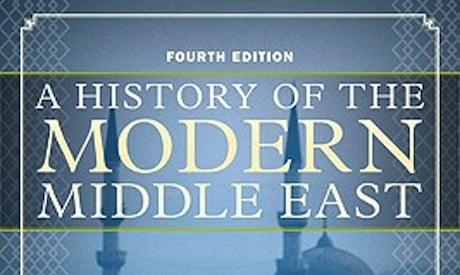 |
| The inexplicably banned book. |
A few days ago a Mid-East history textbook was inexplicably banned, a book that had reportedly already been in use by the American University in Cairo for 10 years. There are varying claims of journalists/writers in state-owned newspapers and media being censored. The information ministry was not abolished, which was a unanimous revolutionary demand, and the parliament's upper house continued the tradition of appointing editors of state owned print media, this time choose controversial picks who are said to at least be likely to attempt to appease the new regime.
And while Al-Dostour and Al-Faraeen are both, for me, tabloid media at best, their content is questionable and both could indeed deserve some legal investigation, there have been complaints that the recent moves against them and their figureheads were not done in the manner that would set the best possible modus operandi for such future pursuits.
Even debates on the potential restriction of freedom of worship in the next constitution, the continued detention of militarily-tried prisoners (until recent laudable moves by Mohamed Morsy to free them and/or reconsider their cases), the questionable trial of Egyptian actor over his body of work, and other questions of concern; there are more of these cases popping up each day. These questions reveal two problems:
1- Organised Power: despite a year and a half after the revolution, electoral alliances, a myriad of new political parties and civil rights initiatives, progressive forces have yet to organise an effective and strong front that can respond immediately to such challenges. The case of the banned book is just being addressed by "waiting," Adel Imam's case was just "harshly criticised" by many figures, and... you get the idea. A lot of anger, condemnation, waiting, and largely just that.
The lack of large, organised and ready groups that can be sufficiently co-ordinated to create real pressures on authorities and other political forces on such issues is direly being felt. For example, there should be a substantial stock of trained lawyers ready to be launched pro bono for such cases; a mechanism to peacefully use the street in expression of political demands; a coordination mechanism for the launch of new political development initiatives and - most importantly - the ability to sustain internal efforts and external interests on such cases.
Currently, most of these efforts appear to be undertaken by passionate smaller groups and individuals who usually do not have the resources or the capacity to mount large sustained efforts, nor succeed in effectively keeping the media's attention to their causes.
2- Organised Framework: the second, and inextricable, problem is that the continued lack of a formulation of a coherent progressive ideology has left such forces unable to properly and fully formulate their arguments against certain forms of censorship or challenges in a manner that might better gain the support of a wider segment of a society, one with a clear moderate-conservative leaning.
The point is: the more the precedents of such cases that are set without proper response mechanisms put in place and effectively used, the harder it will be to go back on such precedents, and the harder it will be to argue against repetitions of such cases. The time for all of this was yesterday. Today is still good though.
No comments:
Post a Comment